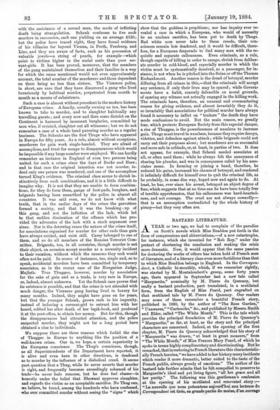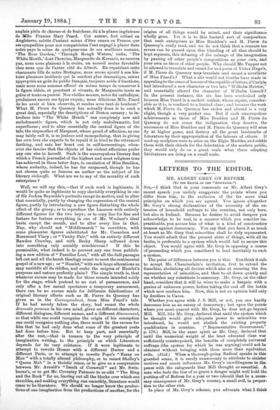BASTARD LITERATURE.
AYEAR or two ago, we had to complain of the parodies on Scott's novels which Miss Braddon put forth in the form of compressions and abbreviations,—of a new catastrophe, for instance, which she invented for "Rob Roy," under the pretext of shortening the conclusion and making the crisis more dramatic. Now, it would appear that the same passion for doctoring the works of others has taken hold of French men of literature, and of a literary class even more fastidious than that to which Miss Braddon belongs in England. In the Corresrpon- dant, a Catholic bi-mouthly, which, if we remember rightly, was started by M. Montalembert's group, some forty years ago, there appeared in September last a new tale called "Marguerite," nominally by M. Pierre du Quesnoy, but really a bastard production, part translated, in a mutilated form, from the English of Miss Peard, part engrafted on that mutilated tale by M. Pierre du Quesnoy. Our readers may some of them remember a beautiful French story, published in 1880, by the author of "The Rose Garden," "Unawares," " Cartouche," &c., and published by Messrs. Smith and Elder, called "The White Month." This is the tale which provides the principal foundation of M. Pierre du Quesnoy's "Marguerite," so far, at least, as the story and the principal characters are concerned. Indeed, at the opening of the first chapter, M. Pierre du Quesnoy acknowledged that his story of " Marguerite " was drawn, "at least in great measure," from "The White Month," of Miss Frances Mary Peard, of which he spoke in terms highly complimentary and discriminating. But he remarked, that in restoring to French literature this characteristic- ally French heroine, "we have added to her history many incidents which render it more dramatic, better suited to the taste of the French public, always greedy of emotions." The author of the bastard tale further admits that he felt compelled to preserve to Marguerite's ideal and yet living figure, "all her grace and all her purity." The following was this gentleman's confession at the opening of his mutilated and renovated story :— "La nouvelle pie nous prosentons aujourd'hui aux leeteurs du Correspondent eat tires, en gran.de partie du wens, d'an. onvrage anglais plein de charme et de fratchenr, tin h la plume ingenieuse de Mlle. Frances Mary Peard. Cet anteur, fort estime en Angleterre, merite d'autant mieux d'être contra en France, qua see sympathies pour nos compatriotes l'ont engage h placer dans notre pays la scene de quelques-nns de sea meilleurs romans, 'The Rose Garden," Through Rough Waters,' enfin, The White Month,' dont rheroine, Marguerite de Kernaec, ne recevra pas, nous nous plaisons h in croire, an accenil moms favorable chez nous qua de l'autre cote du detroit. En repatriant cette charmante file de notre Bretagne, nous avons ajoute h son his- toire plusiews incidents qui la renclent plus dramatique, miens appropride an goat an public frangais, toujours avide d'emotions, mais nous nous eommes efforce en meme temps de conserver in figure ideale, et pourtant si vivante, de Marguerite touts sa grace at tonte sa purete. Nos vieilles mmurs, notre foi catholique, produisent encore ces types exquis ; nous felicitous Mlle. Peard de lea avoir si hien observes, et rendus avec taut de bonlieur." What M. Pierre du Quesnoy has actually done is to omit a great deal, especially the descriptions of Breton scenery; to in- troduce into "The White Month" one completely new and melodramatic figure, which is not only melodramatic, but superfluous ; and to alter essentially the central figure of the tale, the stepmother of Margaret, whose greed of affection, as one may fairly call it, is so jealous and monopolising, that in giving her own love she expects to be repaid it in kind to the uttermost farthing, and eats her heart out in self-tormentings, when- ever she fancies that the objects of her violent affections prefer any one else to herself. Such is the unscrupulous literary feat which a French journalist of the highest and most religions tone has achieved in these latter days, in emulation of Miss Braddon, whose audacity, indeed, he has far surpassed, though he has not chosen quite so famous an author as the subject of his literary rechauffe. What are we to say of the morality of such enterprises ?
Well, we will say this,—that if such work is legitimate, it would be quite as legitimate to copy slavishly everything in one of Sir Joshua Reynolds's portraits except its motive, and to alter that essentially, partly by changing the expression of the central figure, partly by introducing a new figure disturbing the whole effect of the group ; or to reproduce the Laoroon with entirely different figures for the two boys ; or to copy line for line and feature for feature everything in one of Mr. Woolner's ideal busts except the mouth, and to alter every line in that. Nay, why should not " Middlemarch " be rewritten, with some pleasanter figures substituted for Mr. Casaubon and Rosamond Vincy ; or "Vanity Fair," with an entirely different Rawdon Crawley, and with Becky Sharp softened down into something only amiably mischievous P If this be permissible, what indeed is to prevent any one from publish- ing a new edition of "Paradise Lost," with all the dull passages left out and all the harsh theology recast to meet the sentimental gospel of anew age ; or "Hamlet," with such large alterations as may unriddle all its riddles, and make the enigma of Hamlet's purposes and nature perfectly plain ? The simple truth is, that whatever excuse may be made for those recasts intended solely for the stage, which pretend to no sort of permanence, and only offer a few casual spectators a temporary amusement, there can be no excuse made for deliberate falsifications of original literary efforts such as M. Pierre du Quesnoy has given us in the Oorrespoudant, from Miss Peard's tale. If he had merely taken the story, had recast the whole dramatis personae in his own mind, given us different characters, different dialogues, different names, and a different anauentent, so that while one could recognise the origin of his conception one could recognise nothing else, there would be the excuse for him that he had only done what some of the greatest poets had done before him. But to keep part, and essentially alter the rest,—that is treason to the very principle of imaginative writing, to the principle on which Literature depends for its very existence. If it were legitimate to attempt to rewrite Homer with a different Hector and a different Paris, or to attempt to rewrite Pope's "Essay on Man" with a totally altered philosophy, or to recast Shelley's "Queen Mab " in a theistic sense, or to give us a compromise between Mr. Arnold's "Iseult of Cornwall" and Mr. Swin- burne's, or to get Mr. Coventry Patmore to re-edit "The Ring and the Book" for us, leaving out all the blocks over which one stumbles, and making everything run smoothly, literature would cease to be literature. We should no longer know the produc- tions of one imagination from the productions of another, for the origins of all things would be mixed, and their significance wholly gone. Yet it is to this bastard sort of composition that such enterprises as Miss Braddon's and M. Pierre du Quesnoy's really tend, and we do not think that a censure too severe can be passed upon this blending of all that should be kept separate, this debasing of the coinage of the imagination by passing off other people's compositions as your own, and your own as those of other people. Why should Mr. Tapper not be allowed to translate and recast for us a poem of Victor Hugo's, if M. Pierre du Quesnoy may translate and recast a novellette of Miss Peard's ? What a stir would not Goethe have made in appealing to the sense of honour of the republic of letters, if Carlyle had introduced's new character or two into " Wilhelm Meister," and essentially altered the character of Wilhelm himself P In the present instance, the sin has been overlooked only because Miss Peard is a modest author, whose repute, consider- able as it is, is confined to a limited class ; and because the work which M. Pierre du Quesnoy has stolen and altered is a very slight, though a very perfect one. But if such unscrupulous achievements as those of Miss Braddon and M. Pierre du Quesnoy do not rouse the indignation they deserve, the successors of Miss Braddon and M. Pierre du Quesnoy will soon fly at higher game, and destroy all the great landmarks of Literature by their appropriation of the labours of others. If used-up sculptors were to seize on the Elgin Marbles, and cobble them with their chisels for the delectation of the modern public, they would only do on a great scale what these adapting litt erateurs are doing on a small scale.



































 Previous page
Previous page